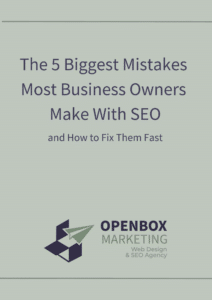Don't let SEO mistakes hinder your business's online success. Download our FREE guide today and unlock the strategies to optimise your visibility and avoid common pitfalls. Take charge and get your guide now!

What is Influencer Marketing?

Influencer marketing is a form of social media marketing involving collaboration with influencers – persons with a large base of followers on social media platforms and seen as experts in their niche. When influencers endorse your brand, the trust and credibility they have with their followers enable you to reach a larger audience that helps grow your business.
How Do You Leverage Influencer Marketing?
To leverage influencer marketing, you need to find the right influencer for your brand. Collaborating with an influencer can determine the success (or failure) of your marketing campaigns. Therefore, you need to do your research before deciding which influencer to work with. Consider:
The Audience of the Influencer
Study the audience of the influencer to determine if the age, gender, location and other demographic features of their followers fit your target audience. Check also if their followers are real and not fake.
The Content the Influencer Posts
Is the content posted aligned with the values of your brand? No matter the number of followers, if the content posted by the influencer contradicts your brand values, collaborating with such an influencer could harm the reputation of your brand instead of promoting it.
Relevance is also paramount: choosing an influencer that activates in a related, complementary or similar domain to your business can create a stronger connection between your brand and the audience of the social influencer.
The Platforms Where the Influencer is Active
To ensure your marketing efforts are successful, you need to choose an influencer active on the same platforms as your target audience.
If you want to reach an audience on different platforms than you are currently active on, you need to define a thorough plan to achieve this objective before signing an agreement with the influencer.
The Influencer's Interest in Your Brand
An influencer genuinely interested in your brand will convey that authentic interest to their followers, increasing the effectiveness of your marketing campaigns.
Real fans of influencers can spot an artificial message, including product endorsements, so make sure your brand is not associated with a lack of authenticity.
The Performance and the Reputation of the Influencer
Check the influencer’s performance metrics like the number of comments, likes, shares of their posts and engagement rate, which are good indicators of how influential their activity is and the potential reach when they endorse your brand.
The reputation is paramount: you need to ensure that nothing from the influencer’s past activity or partnerships can hurt your brand.

What are the 3 R's of Influencer Marketing?
Understanding influencer marketing involves understanding the target audience of your brand and what you need to do to reach it.
Relevance refers to whether the content shared by the influencer is relevant to your brand or not.
Reach means the size of the audience and whether that size can bring value to your brand.
Resonance describes how meaningful will be your brand (or content) to the followers of the social influencer.
When talking about reach, you need to establish if you want to communicate the message of your brand to a smaller but more engaged audience or a larger but less engaged one. The reach you target can influence the type of influencers to work with:
- Nano-influencers usually have one thousand to ten thousand followers, focus on a niche segment and have a very engaged audience;
- Micro-influencers count 10 to 100K followers with a high level of engagement and are also focused on particular niches;
- Macro-influencers are usually bloggers, social media stars and vloggers with a fan base between 100K and 1M followers. Due to the size of their audience, the engagement rate is lower than that of nano and micro-influencers;
- Mega-influencers have more than one million followers. Their recommendations (or endorsements) count, but their engagement rate is a lot lower than that of other type of influencers.
How Does Influencer Marketing Increase Engagement?
Influencer marketing increases engagement through creative content. And since not all content is created equally, you can maximise your engagement by using high-quality, aesthetic visuals, storytelling, humour, different formats and interaction-encouraging content.

What are the Key Strategies in Influencer Marketing?
Define Your Objectives and KPIs
Define the objectives of your campaigns and assign realistic Key Performance Indicators (KPIs) for them.
Each objective has specific KPIs – for example, brand awareness is measured using reach, shares, impressions and mentions, whilst generating leads is tracked with the help of conversions, clicks and sign-ups.
Create and Share Engaging Content
The content you want your collaborating influencer to share must be relevant and present your brand in a genuine, premium way. It should encourage reactions from followers, whether comments or shares and should be perceived as interesting and engaging.
Build a Relationship with the Influencer
A relationship based on mutual trust and respect benefits you and the influencer. You need to establish from the beginning the expectations, deliverables and guidelines of your partnership and maintain regular communication and feedback throughout the collaboration.
What Makes Influencer Marketing so Effective?
Collaborating with a person with an established relationship with a base of followers helps your brand extend its target audience or reach a new one.
Influencer marketing is effective because the followers of the influencer share common interests, which makes it easier for brands to access a pool of potential customers in specific demographics.
Followers trust endorsements made by influencers they are subscribed to and contribute to increasing brand awareness for products included in your marketing campaigns. When these campaigns are comprehensive and have the right strategy and flawless execution, they will deliver a higher engagement rate, attract new customers, establish your brand as reputable and drive higher sales.
Share this Article

Janet Podham
Janet Podham is the owner of Openbox Marketing Limited. She has a post-graduate diploma from the University of Otago, majoring in Data Science. She has spent two years studying website design and SEO in the Champions Masters Program at the eBusiness Institute in Australia. She loves helping people and knits for local foster children in her spare time.






